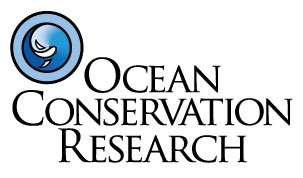This week I delivered a paper on the historic noise levels in the ocean prior to industrialized whaling. It turns out that the ocean was pretty noisy back in 1800, but the noise was all biological − with a preponderance…
Category: Bioacoustics
New discovery of songful bowheads
It’s always a delight to learn something new about ocean life. Some 40 years ago whale researcher Roger Payne came to understand that Humpback whales sang complex, beautiful, and patterned songs. Their haunting melodies released in an LP as “The…
NYT Report of whales “self-mitigating” for noise exposure a bit misleading.
A New York Times article is making the rounds about how a captive false killer whale has demonstrated a mechanism for attenuating potentially damaging noises. Paul Nachtigall, the principal investigator of the study has conditioned the subject to de-sensitize its…
Singing fish lead to conservation programs
OCR associate and marine biologist Mario Rivera has received coverage in Costa Rica’s “El Financiero” for his work with singing fish. He is using sound-pattern recognition software to identify breeding aggregations of fish – in this case “weakfish” (Cynoscion squamipinnis) to determine…
BlueMind conference at Cal Academy
Ocean Champion J. Nichols has coordinated an event on June 1 and 2 at the California Academy of Science that explores neuroscience and the ocean. While the reception on June 1 and the daytime conference on June 2 are both…
SF Bay Area presentation on Marine Mammal Bio-acoustics
If you are in or around Sausalito, CA on Thursday Feb. 24, the American Cetacean Society has invited me to give a presentation on Marine Mammal Bioacoustics. The Bay Model Visitor Center is an Army Corps of Engineers facility that…
Fantastic ocean monitoring website!
Michel André, Director of the Laboratorio de Aplicaciones Bioacústicas (LAB) has developed a fabulous ocean monitoring tool called LIDO – “Listening to the Deep Ocean” that incorporates a number of hydrophones in the Mediterranean, Atlantic, North Sea and Pacific Ocean.…
Noise can confound habitat choices of reef fish
A recent paper in Behavioral Ecology indicates that noise pollution may confuse the recruitment of larval reef fish to safe habitats. Coral reefs set up and interesting quandary for larval-stage reef inhabitants. When they are tiny, their “mother reef” is…
A ‘new’ source of data for sub-lethal noise impacts!
One of the more vexing challenges in understanding the effects of noise on marine animals has to do with assessing the “sub-lethal” impacts that compromise biological functions. These include the impacts from noises that mask or hide biologically significant signals,…
Field Report from the Acoustics Society Meeting
I am spending the week in Baltimore, Maryland with a large aggregation of acousticians – perhaps 2000 folks, presenting papers and conferring about all matters acoustic. (A good collective pronoun might be a “treatment of acousticians…”) The field of acoustics…
